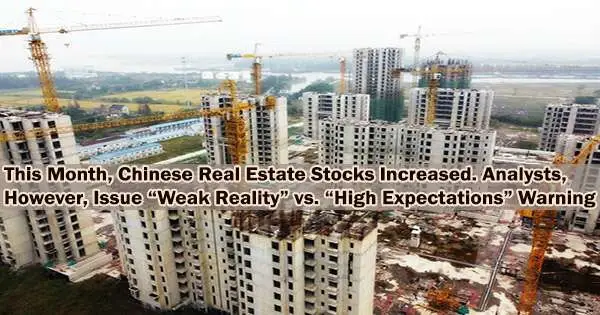Despite a rise in the stocks of significant property developers this month, China’s real estate market is not yet ready for a speedy comeback.
This is so because, according to economists, Beijing’s most recent support doesn’t directly address the primary issue of declining property sales and prices.
Stocks of real estate developers rose this week as a result of reports that the central bank and banking regulator had taken action to encourage banks to support the real estate sector. It comes alongside other support measures earlier this month.
Shares of Long For have increased by about 90%, and those of Country Garden, the largest Chinese developer by sales, have more than doubled in November. Some of the gains from this month have already been lost by the stocks.
In the meantime, this month’s gains in iron ore futures were roughly 16%. According to Morgan Stanley analysts, the building of real estate accounts for around 40% of China’s steel consumption.
The situation is one of “strong expectations, but weak reality,” and market prices have deviated from the fundamentals, Sheng Mingxing, ferrous metals analyst at Nanhua Research Institute, said in Chinese translated by CNBC.
Sheng said it’s important to watch whether apartments can be completed and delivered during the peak construction period of March and April.
This really is a temporary relief in terms of the developers having to meet less debt repayment needs in the near future…
Samuel Hui
The new policies, which are unofficially announced but widely reported in China, call for treating all developers equally regardless of whether they are state-owned and specify loan extensions. They also support bond issuance. Neither regulator responded to CNBC’s request for comment.
“This really is a temporary relief in terms of the developers having to meet less debt repayment needs in the near future a temporary liquidity relief rather than a fundamental turnaround,” Hong Kong-based analyst Samuel Hui, director, Asia-Pacific corporates, Fitch Ratings, said Wednesday.
“The key is that we still need the fundamental underlying home sales market to improve,” he said, noting homebuyer confidence relies on whether developers can finish building and delivering apartments.
Earlier this year, many homebuyers refused to continue paying mortgages on apartments when construction was delayed. Homes in China are typically sold ahead of completion, generating a major source of cash flow for developers.
A drawn-out recovery
Analysts differ on when China’s property market can recover.
Fitch said a timeline “remains highly uncertain,” while S&P Global Ratings’ Senior Director Lawrence Lu expects a recovery could occur in the second half of next year.
“If this policy is implemented promptly, this will stop the downward spiral to the developers, this will help to restore the investors’ confidence [in] the developers,” he said.
Residential housing sales for the first 10 months of the year dropped by 28.2% from a year ago, the National Bureau of Statistics said last week. S&P Global Ratings said in July it expects a 30% plunge in sales for 2022, worse than in 2008 when sales fell by about 20%.
A slowdown in economic growth, uncertainty about ongoing Covid controls and worries about future income have dampened appetite for buying homes.
Adding to those worries are falling prices.
Housing prices across 70 cities fell by 1.4% in October from a year ago, according to Goldman Sachs analysis of data released Wednesday.
“Despite more local housing easing measures in recent months,” the analysts said, “we believe the property markets in lower-tier cities still face strong headwinds from weaker growth fundamentals than large cities, including net population outflows and potential oversupply problems.”
The report said housing prices in the largest, tier-1 cities rose by 3.1% in October from September, while Tier-3 cities saw a 3.9% drop during that time.
About two years ago, Beijing began to crack down on developers’ high reliance on debt for growth. The country’s most indebted developer, Evergrande, defaulted late last year in a high-profile debt crisis that rattled investor confidence.
Since then, concerns about the ability of once-healthy developers to pay back their debt have spread to other real estate companies. Trading in shares of Evergrande, Kaisa and Shimao is still suspended.
















